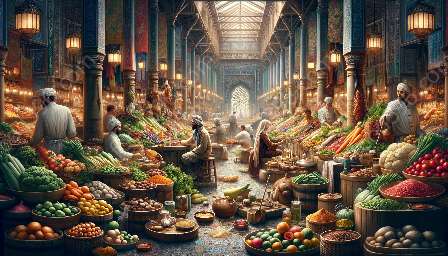The early modern period was a time of opulence and extravagance, particularly when it came to banquets and feasting. This article will delve into the rich history of banquets in the early modern era, exploring their significance, traditions, and influence on cuisine history.
Early Modern Banquets: A Spectacle of Opulence
Banquets in the early modern era were grand affairs, often hosted by royalty, nobility, or wealthy merchants. These lavish events were an opportunity to showcase wealth and social status, as well as to entertain and impress guests. The banquets were not simply about sumptuous dining; they were an extravagant display of power, prestige, and hospitality.
Extravagant Displays and Entertainment
One of the defining features of early modern banquets was their extravagant displays and entertainment. The tables would be adorned with elaborate centerpieces, and the food itself was often presented in a highly decorative manner. Musicians, dancers, and jesters were commonly employed to entertain guests, adding to the festive and opulent atmosphere.
Feasting Traditions and Rituals
The feasting traditions of the early modern era were steeped in ceremony and ritual. Banquets often followed strict protocols and etiquette, with specific rules governing seating arrangements, toasts, and dining etiquette. The serving of food was a carefully choreographed affair, with elaborate courses served in a particular order, often accompanied by speeches and ceremonial gestures.
Influence on Culinary Culture and Dining Habits
The banquets of the early modern era had a profound influence on culinary culture and dining habits. They introduced new and exotic foods, spices, and cooking techniques to European society, spurring an era of culinary exploration and innovation.
Introduction of Exotic Ingredients
Explorations and trade with distant lands during the early modern period brought a plethora of exotic ingredients to Europe. The banquets of this era showcased these newly acquired ingredients, such as spices, sugar, and exotic fruits, which were used to create elaborate and luxurious dishes. This influx of new flavors and ingredients transformed European cuisine, paving the way for a more diverse and globally influenced gastronomy.
Evolution of Dining Habits
The opulent banquets of the early modern period also shaped the dining habits and etiquette of European society. Elaborate dining rituals and etiquettes seen at these banquets filtered down to the wider populace, influencing the way people dined and entertained in their own homes. The concepts of fine dining, table manners, and elegant presentation of food were popularized through these extravagant feasts, contributing to the refinement of European dining culture.
Early Modern Cuisine History
The history of early modern cuisine is deeply intertwined with the tradition of banquets and feasting. The elaborate dishes, exotic ingredients, and dining rituals showcased at banquets played a significant role in shaping the culinary landscape of the time. The cuisine of the early modern period was characterized by a fusion of flavors and culinary techniques brought about by global exploration and cultural exchange.
Emergence of Culinary Innovations
As the banquets of the early modern era introduced new ingredients and cooking styles, they spurred a wave of culinary innovations. Chefs and cooks experimented with novel combinations of flavors and techniques, leading to the creation of exceptional dishes that laid the foundation for modern European cuisine. This period marked the emergence of iconic dishes and culinary techniques that continue to influence gastronomy today.
Impact on Cuisine History
The opulence and extravagance of early modern banquets left an indelible mark on cuisine history. The grand feasts of this era not only influenced the evolution of European culinary traditions but also set the stage for a global exchange of food cultures and ingredients. The fusion of flavors and culinary traditions that emerged from these banquets contributed to the rich tapestry of global cuisine history.
Legacy of Early Modern Banquets
The legacy of early modern banquets continues to be seen in the culinary world. Many of the dining customs, foods, and cooking techniques that originated from these grand feasts remain integral to modern gastronomy. The influence of early modern banquets on cuisine history endures, serving as a testament to the enduring impact of these extravagant and lavish gatherings.

